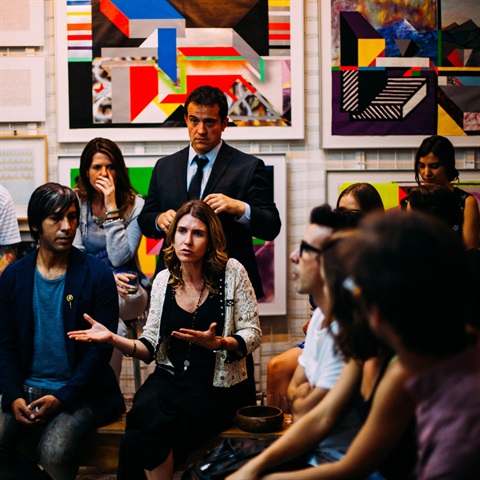Organising a Creative Event

Looking to organise an event for the first time? Our guide covers points to consider as you start planning.
Concept and Vision
Do you have an event idea that excites you? That’s a great place to start! Now, ask yourself some key questions to help bring the idea to life:
- What is the purpose of your event? It might be sharing skills and knowledge, marking an occasion, encouraging community participation, showcasing an art form or even creating new artwork.
- Who is it for? Artists, writers, music-lovers, educators, families, marginalised communities? Ideally, how many people would you like to attend?
- What does it look like? People sitting in a park listening to music, a teaching artist in a room full of young students, an interactive space where members of the public take turns to participate, three dancers on a stage?
- Will you set a theme?
- Will participating artists be selectively invited or can anyone express interest?
- Will it be weekly, monthly, annual or a one off?
- What is the best season and time of year for the event?
Etiquette
Are there similar events already taking place in your local area? If so, reach out and build a relationship with the organisers. It’s always a good idea to start a new event in the spirit of collaboration rather than competition. The organisers likely have the same passions as you and by staying connected you can expand each other’s audiences and offer valuable advice. You will need to find a point of difference, something that makes your event unique.
Budget
Make a realistic budget for your event listing all expenses including venue and equipment hire, catering, artist fees, promotion, transport, printing and supplies. Don’t forget to factor in insurance for your performers or volunteers.
Consider how you will pay for the expenses – should you apply for a grant? Fundraise? Approach a sponsor?
If you are covering some costs by charging entry for your event, research the ticket prices of similar events and make sure your price is reasonable.
Partnerships
Before you approach a potential partner for support, see if they have annual reports or strategic plans available on their website. How can you present your event to them in a way that aligns with their values and goals?
If you are fortunate enough to find an organisation or community group who is willing to donate space, money, advertising or resources, be sure to offer them something in return (promote them on social media, include their logo on your website, offer them free or backstage entry to your event). Put the agreed exchange of goods and services in writing to ensure everyone is on the same page.
Venue
When picking a venue, you should consider:
- Accessibility: how do wheelchair users or patrons with disability move in and out of the venue? Is there a hearing loop for patrons who are Deaf or hard of hearing?
- Is it central, close to public transport and easy for people to find?
- What is the capacity?
- Is it within your budget? Are there hidden costs? (for example, does the use of audio equipment incur an extra charge?)
- Does it fit the desired mood your event?
- Is it suitable for your intended audience?
- Is there access to office space, tea and coffee, free WIFI?
Manage Risk
Whenever you are organising an event, it is important to manage your risk to ensure people stay safe. Check to see if you need to get event insurance or to get any special licences. Put together a risk management plan, identifying things that could go wrong and how you can reduce the chance of that happening. Depending on the size and location of your event, you might also like to get in touch with the local police to let them know that this event is happening.
People Power
If you are operating on a small budget, you might like to call on your networks and community to volunteer their skills. However, if you can afford to reward people – or even pay them – this is always preferable. Fostering good will makes any event more sustainable in the long run.
Depending on the size and format of your event you might need emcees, crowd control, a decorations committee, front-of-house, stage managers, drivers and people with audio-visual expertise.
Promotion
How you promote your event will depend on your budget. Start with social media, call on your friends, family, colleagues and community to spread the word far and wide. Write a press release and send it out to your local media outlets. If you have any budget for promotion, consider paid advertising in a newspaper or on a website with a large audience.
Ask for Feedback
Provide feedback forms for everyone involved in the event, from performers and volunteers through to partners and audience members. Take the feedback on board when you are planning your next event.
Additional Resource
Arts Law has prepared an information sheet providing an overview of the legal issues to consider when organising a creative festival. Find out more.